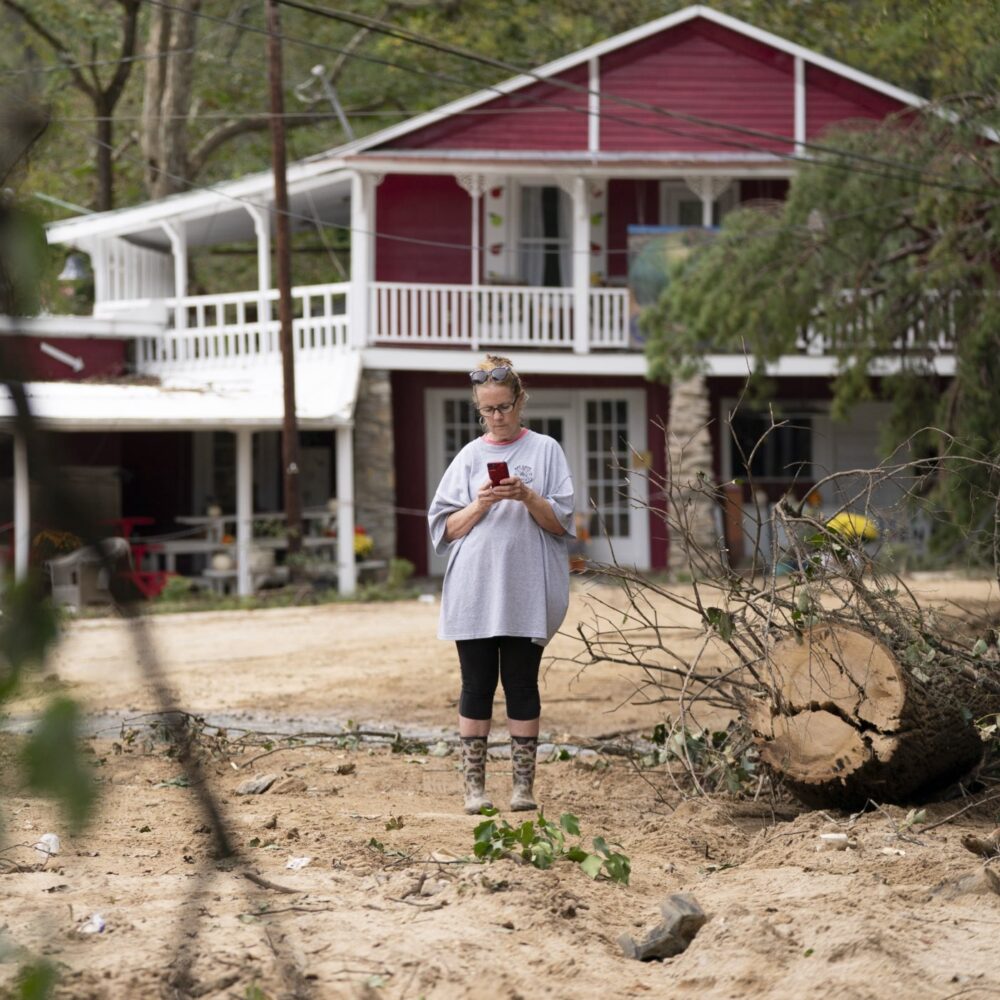Skip to content
Temporary authority comes after Musk slammed FCC for not giving money to SpaceX.

Marie O'Neil looks at her smartphone in the aftermath of Hurricane Helene on October 1, 2024 in Bat Cave, North Carolina.
The Federal Communications Commission gave Starlink and T-Mobile emergency authority to provide satellite-to-phone coverage in areas hit by Hurricane Helene.
"SpaceX and T-Mobile have been given emergency special temporary authority by the FCC to enable Starlink satellites with direct-to-cell capability to provide coverage for cell phones in the affected areas of Hurricane Helene," SpaceX said yesterday. "The satellites have already been enabled and started broadcasting emergency alerts to cell phones on all networks in North Carolina. In addition, we may test basic texting (SMS) capabilities for most cell phones on the T-Mobile network in North Carolina."
SpaceX warned of limits since the service isn't ready for a commercial rollout. "SpaceX's direct-to-cell constellation has not been fully deployed, so all services will be delivered on a best-effort basis," the company said.
Starlink is being used to provide wireless emergency alerts to cell phones from all carriers in North Carolina, according to Ben Longmier, senior director of satellite engineering for SpaceX. "We are also closely monitoring Hurricane Milton and standing by ready to take action in Florida," he wrote.
Temporary spectrum authority
The FCC said the approval "enabl[es] SpaceX to operate Supplemental Coverage from Space (SCS) in the 1910–1915 MHz and 1990–1995 MHz frequency bands leased from T-Mobile in areas affected by the Hurricane Helene." An FCC spokesperson told Ars that the approval is for all areas affected by Hurricane Helene, although it's only active in North Carolina so far.
The FCC also said that it is granting "special temporary authorities to licensees and issuing rule waivers to help communications providers maintain and restore service, support emergency operations, and assist public safety, including search and rescue efforts." Separately, the FCC last week waived certain Lifeline program eligibility rules to help people in disaster areas apply for discounted phone and broadband service.
SpaceX began launching satellites with direct-to-cell capabilities in January 2024 and showed a demo of text messages sent between T-Mobile phones via one of Starlink's low-Earth orbit satellites. T-Mobile has said the Starlink service for phones will help cover gaps in areas where it has no coverage "due to terrain limitations, land-use restrictions," and other factors.
AT&T and Verizon intend to offer similar service through deals with AST SpaceMobile, which launched its first commercial satellites last month. AT&T and Verizon recently urged the FCC to reject a Starlink/T-Mobile request for a waiver of rules regarding out-of-band emission limits, claiming the plan will interfere with and degrade service for terrestrial mobile broadband networks.
Musk wants FCC money despite slamming subsidies
SpaceX CEO Elon Musk thanked the FCC for expediting approval of the emergency authority, but has been warring with the commission in recent days. Musk's criticism of the FCC relates to the agency's decision to reject Starlink's final application for $885.51 million in broadband-deployment funding, which is for home Internet service and not related to the satellite-to-cellular capability. Despite claiming that the US government should "remove subsidies from all industries," Musk has made it clear he wants payments from the FCC.
"Had the FCC not illegally revoked the SpaceX Starlink award, it would probably have saved lives in North Carolina. Lawfare costs lives," Musk wrote on October 2. Musk made the comment while sharing a post that claimed, "North Carolina would have 19,522 working Starlink kits available today after Hurricane Helene had the FCC not revoked in bad faith the grant that was awarded to SpaceX as the winning bidder."
The FCC's broadband deployment funding typically goes to Internet providers that have to install wires or other infrastructure in each location that it serves, whereas Starlink users just need a dish to access the satellite network. The FCC funding would have helped offset Starlink's costs, but the grant rejection hasn't stopped Musk's company from providing service in North Carolina.
When the FCC rejected SpaceX's application in 2022, we pointed out that losing the grants "may not impact the actual availability of Starlink much because the satellite service isn't geographically restricted in the same way as wireline networks." The main limitations for Starlink's home Internet service are the available satellite capacity, physical obstacles that block signals to specific locations, and the up-front cost that consumers pay for hardware.
FCC said it rejected wasteful grants
SpaceX's grant was tentatively approved during then-Chairman Ajit Pai's tenure through a funding program that current Chairwoman Jessica Rosenworcel found to be wasteful. Rosenworcel's office last week said Musk's claims about the supposedly "illegal" revocation of SpaceX's Rural Digital Opportunity Fund grant were false, as PCMag reported:
However, the FCC says the $886 million in funding was never revoked; SpaceX merely cleared the initial regulatory hurdle only for the FCC to reject the company's bid after further review... The FCC also told us that even if the $886 million funding had been awarded, the buildout wasn't projected to start until after 2025.
"The commission further questioned what is stopping SpaceX from offering Starlink to the hurricane-stricken areas without using taxpayer dollars," PCMag wrote.
The FCC's 2022 denial of SpaceX's grant called Starlink a "nascent" technology with "recognized capacity constraints," while pointing to falling speeds and the $600 up-front cost.
"Starlink's technology has real promise," Rosenworcel said at the time. "But the question before us was whether to publicly subsidize its still-developing technology for consumer broadband—which requires that users purchase a $600 dish—with nearly $900 million in universal service funds until 2032."
A statement from the FCC last week said that "Chairwoman Rosenworcel stands by the FCC's thorough review of a program meant to provide long-term access to reliable and affordable broadband in rural communities. In this instance, the agency denied public funds to more than a dozen companies—not just Starlink—who did not meet the program requirements. As an independent agency, the FCC takes seriously its obligation to ensure that taxpayer dollars only go to entities that fully comply with the rules and the law."
Jon is a Senior IT Reporter for Ars Technica. He covers the telecom industry, Federal Communications Commission rulemakings, broadband consumer affairs, court cases, and government regulation of the tech industry.

1. Artist appeals copyright denial for prize-winning AI-generated work
2. Greening of Antarctica shows how climate change affects the frozen continent
3. Neighbors sue over loud Bitcoin mine
4. Neo-Nazis head to encrypted SimpleX Chat app, bail on Telegram
5. How London’s Crystal Palace was built so quickly